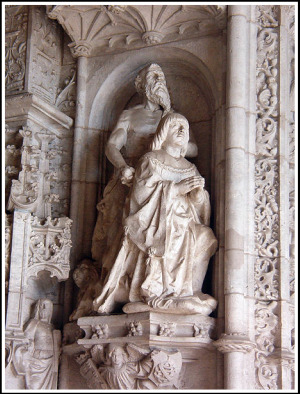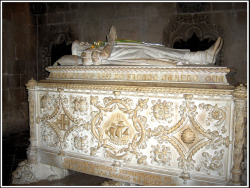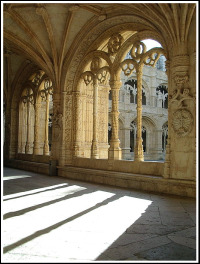Jerónimos
Monastery
(Monastery of the Hieronymites)
As you probably know, the Jeronimos Monastery
is classified as a World
Heritage Site by the UNESCO since 1984. In UNESCO's site
this is what is written:
"Standing at the entrance to
Lisbon harbour, the Monastery of the
Hieronymites – construction of which began in 1502 – exemplifies
Portuguese art at its best."
Although the UNESCO says the construction began in
1502, the official site
of the monument claims that it started one year earlier.
Hummm.... Which one
is right? I sincerely don't know, but I suspect it doesn't matter that
much,
right? After all is been a long time since then...
More curious is that it took almost a century to
finish this great
monument. Wow! And we complaining about the constant delays of the
constructions nowadays... 
When and why?
 In 1496, the King Manuel I asked
permission to the Holly See to build the Monastery. In 1496, the King Manuel I asked
permission to the Holly See to build the Monastery.
It was
built to replace the Church of Santa Maria de Belém.
It was, of course, dedicated to the same Santa Maria
de Belém,
as a thanksgiving for the success of the journey to India. It became the
House of the Monks of Saint Jerome (that gave the name to the
Monastery). This is because of their spiritual work guiding the portuguese
sailors and praying for the king's soul.
The history says that Vasco da Gama and
his men spent the night before leaving to India (a remarkable dangerous
journey) praying in an old Eremite
(Ermida do Restelo)
that existed in that same place.
The
construction began shortly after the arrival of Vasco da Gama from his
trip to India and it was financed with the money generated by the
eastern spices.
Who
can we find there?
 It
served as the first National
Pantheon. It
served as the first National
Pantheon.
Besides the King and his
descendents you can find there some famous portuguese
people.
For example, Vasco da Gama,
who was the commander of the first ships to sail directly from Europe
to India.
Also, Luís
de Camões, poet and writer of Os Lusíadas that
exalt and glory the achievements of Vasco da Gama and his men.
Almeida Garret, Alexandre
Herculano and Fernando
Pessoa, famous portuguese writers.
And Teófilo Braga and Óscar Carmona, Presidents
of the Republic of Portugal.
More
historical events
In
1833 the religious orders were expulsed from Portugal (unfortunately,
this was a very sad time in our history) and the Monastery became
property of the state and served as a college until 1940.
During the restoration 1850, it was added to the Monastery the National
Archaeological Museum.
In the west wing you can also find
the Maritime Museum.
 It was in this magnificent monument
that the Lisbon Treaty
was signed in 2007, laying down the basis for the reform of the
European Union. It was in this magnificent monument
that the Lisbon Treaty
was signed in 2007, laying down the basis for the reform of the
European Union.
I invite you to appreciate the
outstanding cloisters of the Jerónimos Monastery with magnificent columns,
each one decorated with maritime motifs like sea monsters and coils of
rope.
Great monument of the Age
of the Discoveries, the Jerónimos Monastery is a powerful
symbol of the Portuguese power and richness in those days.
Where
can I find it?
It is located in Belém
near the Belém Tower (Torre
de Belém) and the Discoveries Monument (Padrão dos Descobrimentos).
Check it out on the map...
Waiting
for you
Jerónimos
Monastery is one of the best pieces of the Manueline architectural style
(characterized by maritime
motifs and extremely elaborated sculptural details).
It's a must see by every tourist that come to Lisbon.
You just can't miss
it!

|
